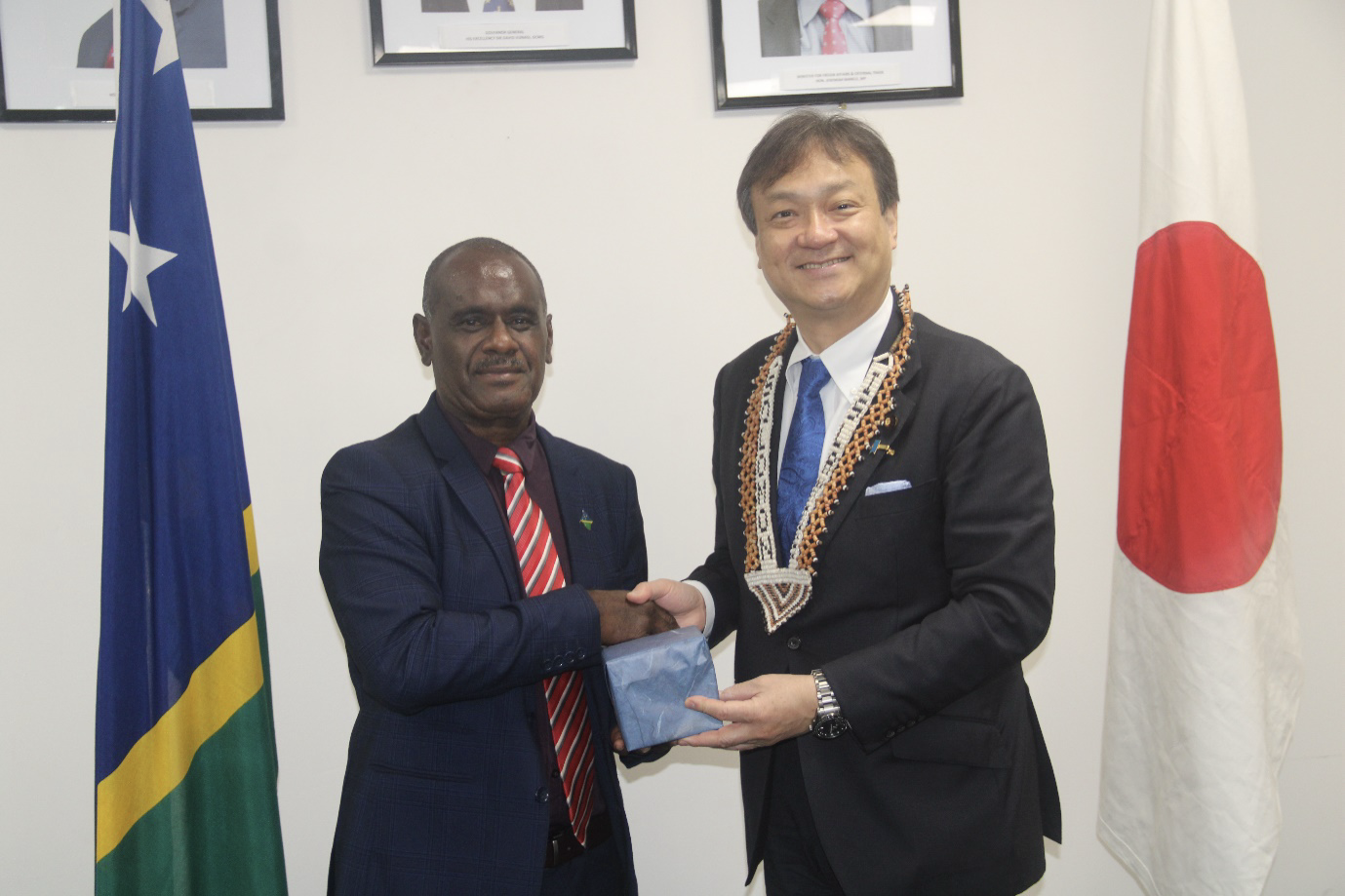
By Ofani Eremae
Japan reiterates it has nothing to hide and has always been open and transparent about the discharge of its treated radioactive water into the Pacific Ocean.
And that the discharge process is being conducted under the watch of the International Atomic Energy Agency (IAEA) – the United Nations atomic watchdog body.
Its State Minister for Foreign Affairs, Horii Iwao, who was in the country this week and left Thursday, reiterated this after meeting his local counterpart Jeremiah Manel.
Iwao was dispatched by his Prime Minister Fumio Kishida and Foreign Minister Yoko Kamikawa to further clarify concerns the Sogavare Government had over the wastewater release.
Manele said in a statement after the meeting that he had used the occasion to reiterate Solomon Islands’ position and its ongoing discomfort on the nuclear wastewater issue.
He said regional concerted efforts led by the Pacific Islands Forum (PIF) and member countries are ongoing and therefore sought the cooperation of Japan and the IAEA and in particular the opportunity for Forum member countries to be able to engage in dialogue with Japan and the IAEA on ongoing monitoring and evaluation of discharged ALPS water.
“Solomon Islands encourages transparency and sharing of information by the Government of Japan, and therefore calls for full access to all data and information on the ongoing monitoring and evaluation of the release,” Manele said..
“This is to enable an assessment of safety, and of environmental and health impacts or we request Japan’s Government to explore other options to discharge the ALPS water,” he added.
But Iwao reiterated that the discharge has been carried out under the watch of IAEA and was done in an open and transparent manner.
Japan began discharging the one million tonnes of radioactive water from its ruined Fukushima Daiichi nuclear power plant into the Pacific Ocean in August by pumping water containing radioactive tritium into the sea – starting off a wastewater discharge process that is expected to take at least 30 years.
The plan has been approved by IAEA.

Visiting Japanese State Minister for Foreign Affairs Horii Iwao facing members of the press in Honiara on Wednesday.
Iwao said his visit to Solomon Islands was not only to boost bilateral ties between the two countries, but also to further assure the Sogavare government about the safety of the process.
Although he was unable to meet Sogavare, he relayed his government’s message to Manele.
“The discharge process has been carried out within the safety standards of IAEA.
“In fact many countries around the world have been releasing water containing radioactive tritium into the sea from their nuclear plants all these years.
“These are done within the safety standards of IAEA. So Japan is not the only country doing this.
“In fact, China releases more tritium from its nuclear plants than what Japan is releasing from the Fukushima plant,” he stated.
China has been the staunchest of opponents against the Japanese discharge. It had imposed an import ban on Japanese fish as a result.
But critics have accused Beijing of hypocrisy and of using the incident to whip up anti-Japanese sentiment.
Scientists have pointed out that China’s own nuclear power plants release wastewater with higher levels of tritium than that found in Fukushima’s discharge, and that the levels are all within boundaries not considered to be harmful to human health.
China’s Fuqing power plant in Fujian province, for example, releases about three times more tritium into the Pacific than the Fukushima discharge.
Beijing appears to be basing its distinction on Japan’s discharge having originated from a nuclear disaster.
“There is a fundamental difference between the nuclear-contaminated water that came into direct contact with the melted reactor cores in the Fukushima nuclear disaster and the water released by nuclear power plants in normal operation,” China’s foreign ministry spokesperson, Wang Wenbin, said recently.
“They are different in nature, come from different sources and require different levels of sophistication to handle,” Wenbin added.
Authorities in Hong Kong also claimed the situation was “completely different” when asked about its ban on Japanese seafood, saying other radioactive substances could also be present.
The Kori nuclear power plant in Busan in South Korea releases a similar amount to Fuqing.
South Korea has also criticised the Fukushima decision, but its government recently said it accepted the IAEA’s safety report approving the plan.
Iwao said a number of countries in the Pacific, including Papua New Guinea, Fiji and Cook Islands have already accepted and understand Japan’s explanation about the discharge.
“ASEAN countries have also accepted our explanation,” he added.
Many scientists agree with the IAEA that the release will have a “negligible” radiological impact on people and the environment.
Dr David Krofcheck, a senior lecturer at the University of Auckland, recently told the media:
“The release of currently filtered cooling water containing tritium atoms from the Fukushima plant will not cause physically detrimental effects.
“Tritium is produced naturally as part of our normal environmental background radiation, and it travels via rain or rivers into the world’s oceans.
“The water release is designed to have seven times less tritium per litre than is recommended for drinking water by the World Health Organization.
“Much more tritium has been released by normally operating nuclear power plants into the north Pacific Ocean since those plants in China, South Korea, and Taiwan, were first located on coastal sites.”
Iwao was hoping to meet Prime Minister Sogavare during his two-day visit, but it appeared the prime minister was “too busy” to see him.
The visiting Japanese state minister said he hopes Manele will convey his government’s message to Sogavare.
Japan is one of the leading donors to the country.
Honiara International Airport runway and terminal, the highway from Henderson to the city centre, the Central Market, Gizo Hospital in Western Province, Auki Market and Jetty in Malaita were among its many offerings.
Currently, it’s in the process of building a new state-of-the-art hospital for Malaita Province.
